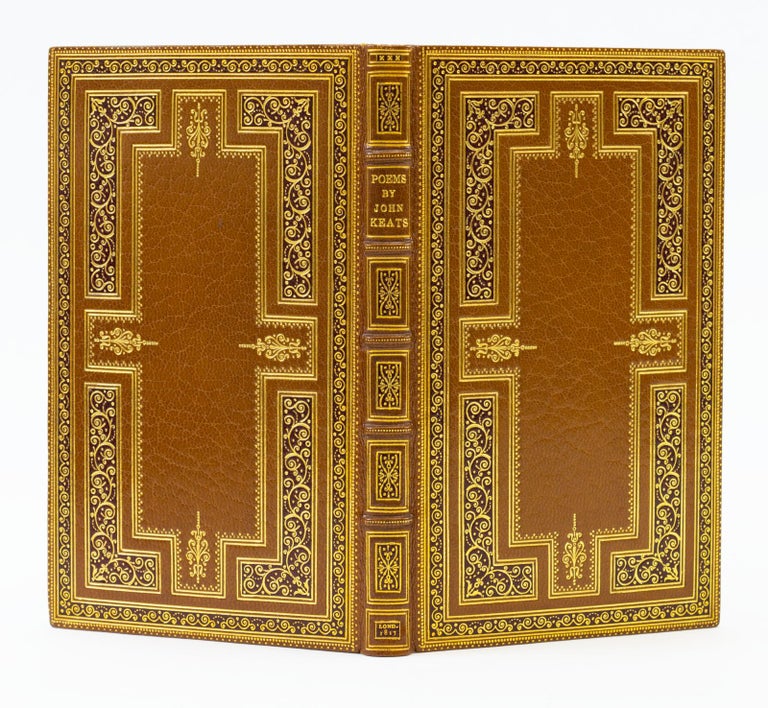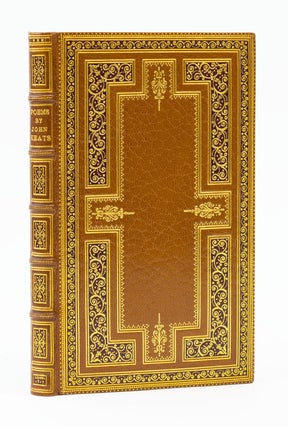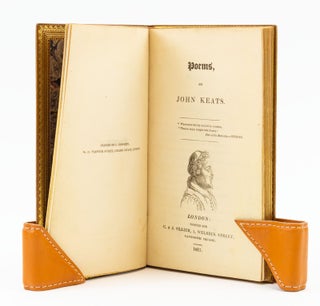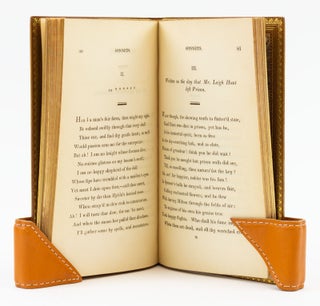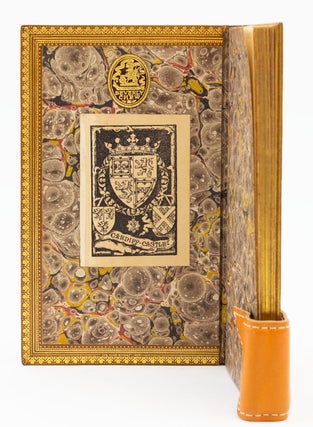POEMS.
(London: C. & J. Ollier, 1817). 165 x 92 mm. (6 1/2 x 3 3/4"). 3 p.l., 121 pp. FIRST EDITION.
EXQUISITE CITRON MOROCCO, GILT AND INLAID, BY THE CLUB BINDERY (stamp-signed and dated 1908 on front turn-in), covers with inlaid frame and cornerpieces of chestnut brown morocco outlined with double rules and densely tooled in gilt, central panel with rectangular extension at center of each side containing a gilt fleuron, raised bands, spine compartments with inlaid panel of chestnut brown morocco tooled with pointillé and small tools, gilt titling, turn-ins with floral roll, marbled endpapers, all edges gilt. In a brown morocco-backed marbled paper chemise. Title page with the bust of a poet in laurel wreath. Front pastedown with armorial Cardiff Castle bookplate of the Marquess of Bute and morocco ex-libris of Beverly Chew. Tail margin of p. 109 with faint annotation in a 19th century hand. Hayward 231; Ashley III:9. ◆Leaves a little yellowed with age, isolated tiny rust spots or minor smudges but A FINE COPY, clean and fresh internally, IN A FLAWLESS BINDING.
This is a volume with every desirable quality imaginable: the first edition of the first book of poems by one of the most important Romantic poets, offered in a splendid binding by the first great American workshop, in beautiful condition and with distinguished provenance. Though the publisher was disappointed in the sales of Keats' "Poems," Day finds the book "filled with youthful enthusiasm for various discoveries," among them poetry, the art and literature of classical Greece, and the beauty of Nature. Among the contents are Keats' first known poem, "Imitation of Spenser"; what Day calls his "first indisputably great poem," "On First Looking into Chapman's Homer"; and his first important longer poem, "Sleep and Poetry." Although he lived but a short time, Keats (1795-1821) left a lasting mark on English literature, and his poetry remains popular to this day. In the words of the Poetry Foundation, "The urgency of this poetry has always appeared greater to his readers for his intense love of beauty and his tragically short life. Keats approached the relations among experience, imagination, art, and illusion with penetrating thoughtfulness, with neither sentimentality nor cynicism but with a delight in the ways in which beauty, in its own subtle and often surprising ways, reveals the truth."
In addition to the importance of the content here, this item is memorable because of its beautiful binding. Once the Grolier Club was founded in 1884 as an organization to further the interests of America's most serious bibliophiles, it soon became apparent that the country's few established hand binders were overtaxed in providing repairs and rebinding for the club members' rapidly accumulating acquisitions. As a consequence, in 1895, Grolier members, along with Edwin Holden and other wealthy collectors, established the Club Bindery in order to attract European craftsmen to provide, close to home, fine quality binding work rivalling what was available abroad. The Club Bindery was in operation until 1909, with Robert Hoe being its most influential manager and client. It provided bindings that tended to be traditional in style--though frequently with elaborate decoration--and that lived up to its patrons' expectations in terms of excellence. The first members of the staff of the Club Bindery were the Englishmen R. W. Smith and Frank Mansell. They were subsequently joined by a number of French binders, chief among them being Leon Maillard, who had worked previously for Cuzin, Gruel, and Marius-Michel, and whose precise and intricate finishing is impressively demonstrated on our binding here. Our binding was commissioned by Grolier Club member Beverly Chew (1850-1924), a successful New York banker who was an extremely discriminating collector, first, of American literature and, subsequently and more importantly, British literature. He bought heavily in 16th and 17th century authors, and sold 2,000 choice titles in this area in one transaction to Henry E. Huntington, probably the most famous of all American book collectors. Dickinson says that Chew was one of the most respected collectors of his time, and that his contributions to the very useful Grolier Club catalogue "Wither to Prior" were invaluable. (ST17787)
Price: $65,000.00

